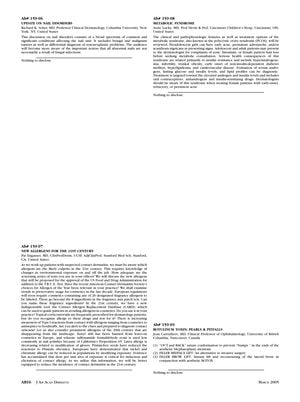New Allergens for the 21st Century
February 2005
in “
Journal of The American Academy of Dermatology
”

TLDR Recognizing new allergens can help reduce contact dermatitis cases.
In the document, Dr. Pat Engasser highlighted the importance of recognizing new allergens in the 21st century for the diagnosis and management of contact dermatitis. The presentation emphasized the need for updated knowledge on environmental exposures and the adequacy of current screening tests. It discussed the proposal of new allergens for inclusion in the T.R.U.E. Test by the US Food and Drug Administration and the relevance of the American Contact Dermatitis Society's Allergen of the Year in clinical practice. The document also mentioned European regulations requiring labeling of cosmetics containing any of 26 designated fragrance allergens, the use of the Contact Allergen Replacement Database (CARD) in avoiding allergens in cosmetics, and the recognition and testing for allergies to topical corticosteroids. Additionally, it addressed the increasing awareness of Type I reactions and the decrease in certain 20th-century allergens due to regulatory changes and exposure modifications. The document concluded that by utilizing knowledge of allergen exposure, the incidence of contact dermatitis could be reduced.




